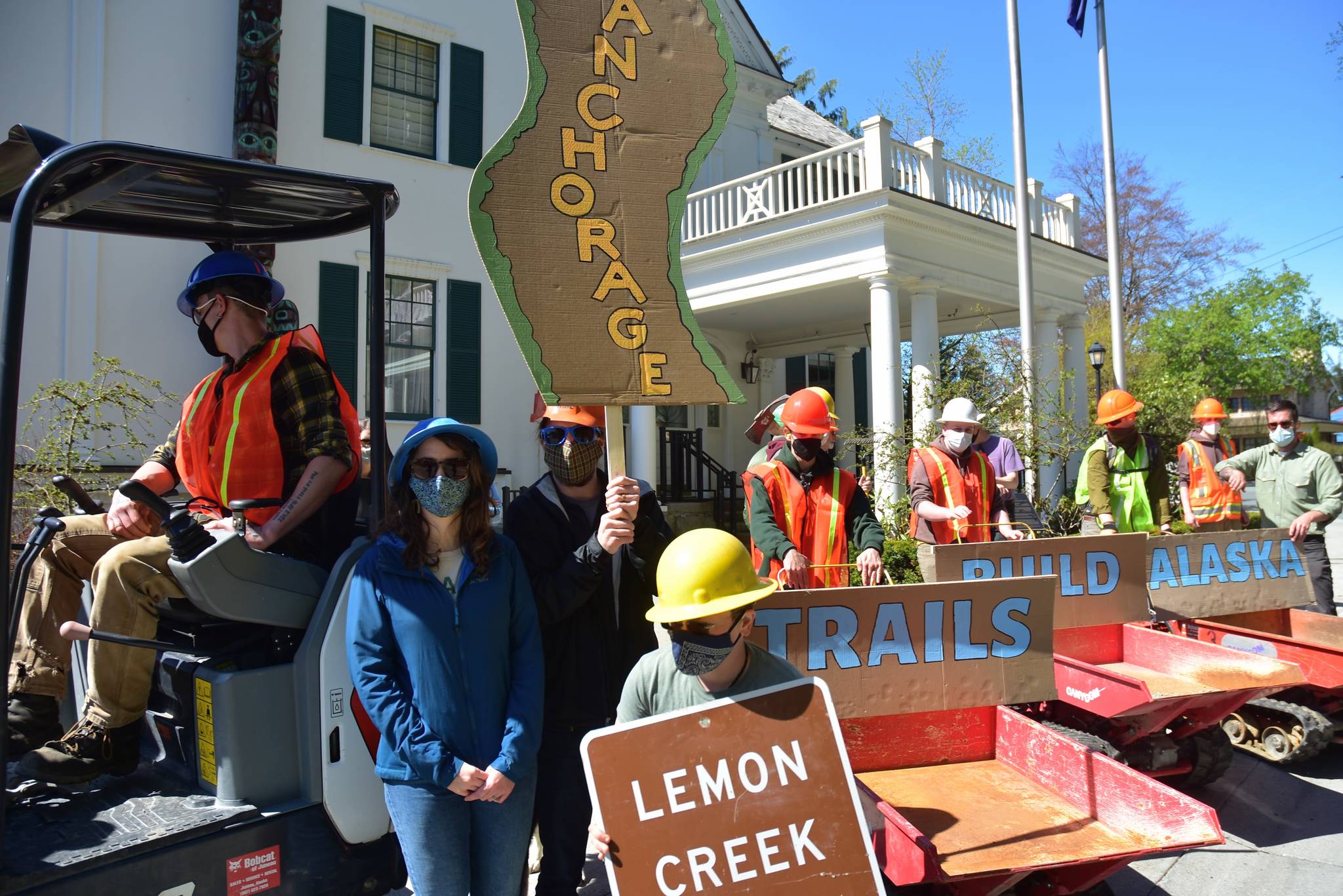A statewide coalition of outdoor groups is urging Alaska lawmakers to use federal relief money to fund a trail-building program they say will provide local jobs and boost the outdoor industry.
Supporters of Trails Build Alaska, an effort to create trails workforce development programs, staged a small demonstration Tuesday with earthmovers and track carriers noisily rumbling down Calhoun Avenue from the Governor’s Mansion to the Capitol.
The demonstration was organized by Trail Mix Inc., the nonprofit group responsible for the maintenance of Juneau’s trails, and called on lawmakers to fund trail-building programs across the state using American Rescue Plan Act money.
“We really see the outdoor recreation industry growing, and we have to build a workforce to accommodate that,” said Ryan O’Shaughnessy, Trail Mix’s executive director. “We have a concept that’s based on our conservation corp program in Juneau.”
When the COVID-19 pandemic ended last year’s tourist season, the City and Borough of Juneau created an Economic Stabilization Task Force to help the city spend federal CARES Act relief money. One of the programs to come out of that task force was the COVID-19 Conservation Corps, a trail-building jobs program based on the New Deal-era Civilian Conservation Corps.
Trail Mix says the program was extremely successful and can be used as a model by other municipalities to establish their own programs. The Sitka Conservation Society and Alaska Trails ran similar programs in 2020, O’Shaughnessy said, with similar success.
Trail Mix’s impact report says the program received a CBJ grant of $460,000, more than half of which went directly to worker paychecks. Other funds spent by the program went to local businesses, the report said, and provided workforce training to employees.
[New New Deal? City announces jobs program]
Trails Build Alaska supporters are asking lawmakers for $12 million to fund conservation corp projects statewide, O’Shaughnessy said, and once those programs are established there are other fund sources available to keep the programs going.
With the $460,000 grants from CBJ, Trail Mix says they were able to employ more than 30 people from July to December 2020 with average wages of $16,200, over 200 hours in workplace training and $18,000 on job training and certification to help employee’s careers.
The idea has bipartisan support in the Alaska State Legislature but the state’s budget isn’t settled yet. Wednesday is the last day of the Legislature’s regular session, but Gov. Mike Dunleavy has called two special sessions to allow lawmakers more time to allocate funds. One session begins May 20 and another Aug. 3, at which point lawmakers hope to have a clearer idea of how to best spend ARPA relief money.
“There’s a lot of value there,” said Rep. Laddie Shaw, R-Anchorage. “I remember the days of that Conservation Corp value that was bringing to the outdoors.”
Shaw said he would support the funding, though he couldn’t say how much had been proposed for the program. The 1930s CCC built several trails in Alaska, Shaw said, including some on Flattop Mountain in his district. The CCC’s handiwork can be seen on trails and in totem poles around the capital city.
“It’s sort of a dilemma because you try to be fiscally conservative, but also you think about the value of what benefits us, relative to humanity, relative to our sense of purpose,” Shaw said. “I live in the outdoors. So setting aside that I am a fiscal conservative, the value of what we get in return is a bang for your buck.”
• Contact reporter Peter Segall at psegall@juneauempire.com. Follow him on Twitter at @SegallJnuEmpire.

